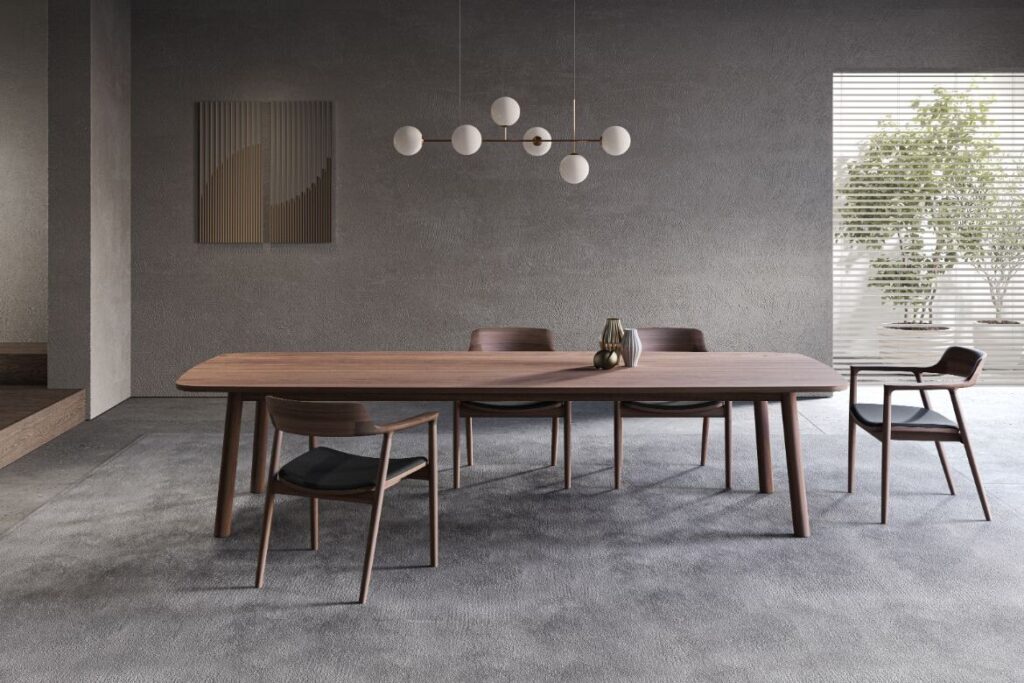Maruni: Japanese sensibility with universal relevance
Whether it’s the elegant simplicity of a traditional tea house, the iconic contours of Shinto shrines or the intricate joinery of a traditional lattice, they all embody the essence of Japanese design – a timeless aesthetic that celebrates natural materials, patient craftsmanship, and a profound respect for form and function.
This very philosophy is the cornerstone of Maruni, a design company founded in 1928 by the visionary Takeo Yamanaka, whose desire to fuse tradition with modern sensibilities still defines the brand today. Raised in Hiroshima’s Miyajima – a region steeped in rich woodworking tradition – Yamanaka was mesmerised by the transformative properties of this natural material, and this fascination shaped his life-long relationship with design. When he graduated university with a degree in mechanical engineering, the Japanese design pioneer established Yamanaka Research Institute with five other crafts people. The Maruni Wood Industry was born.
Yamanaka’s deep respect for timber has framed Maruni’s design ethos, while his visionary nature informed the brand’s dynamic evolution towards a clear goal – to bridge the gap between traditional, hand-crafted furniture and a new era of industrial production. Maruni pioneered the use of innovative technologies and mass manufacturing techniques in the bid to democratise beautiful objects, which essentially revolutionised Japanese design.
Maruni’s trailblazing shifts have always been underpinned by the brand’s commitment to beauty. 2004 marked the launch of the “nextmaruni” project, which carefully re-examined both the process of furniture design and the physical form of the chair. Maruni invited twelve designers from all over the world – including Jasper Morrison from the UK, and Naoto Fukasawa from Japan, who both went on to become Maruni’s Creative Directors – to design chairs as a response to the Japanese aesthetic.
Today, Jasper and Naoto – more recently joined by Cecilie Manz as a fellow Creative Director – continue to celebrate the brand’s cultural heritage and origin story, while embracing its modern, ubiquitous context.
The resulting objects, informed by the essence of everyday living and manufacturing methods that would distinguish these objects as intrinsically Japanese, further refined the brand’s design focus: creating beautifully crafted Japanese furniture with global resonance.
Hiroshima Armchair is a prime example of this intricate design ethos. This iconic object, designed by Fukasawa as part of the “Hiroshima” series, pays homage to Maruni’s birthplace and the tradition of woodworking by emphasising the natural beauty of solid timber through a clean, timeless and universal form. The Lounge Chair reads as a more relaxed take on the same silhouette, with a thin layer of upholstery gently enhancing comfort.
Morrison’s Lightwood Chair explores the same interplay between tradition and modernity. The design embraces the craft of woodworking through the refined simplicity of the timber frame, while the seat is made from a comfortable, modern mesh material. Augmenting the inviting curvature of Fukasawa’s other designs, Roundish Arm Sofa pushes these explorations further. Its gentle, rounded wooden form is upholstered with plush cushions, utilising traditional qualities of timber as a vehicle for modern style and comfort.
These objects epitomise Maruni’s wonderfully unpretentious design blueprint: deep appreciation for timber and careful craftsmanship. Steeped in Japanese tradition, yet designed to defy the concept of borders, many of Maruni’s iconic designs adorn rooms of some of the world’s most thrilling gallery spaces. The Hiroshima Armchair and Lightwood Chair are on display at the V&A in London, while the charming contours of the SANAA Rabbit Chair can be spotted at the Sydney Modern.
The unanimous international recognition and loyal following reveal Maruni as one of the most influential names on the international design scene. The brand’s universally appealing fusions of traditional craft, contemporary manufacturing and sustainable business practices yield designs that respectfully reinterpret Japanese heritage for the global audience, and the contemporary context. In other words, Maruni creates timeless pieces of furniture that transcend time, cultures and borders, and are bound to retain their universally iconic character well into the future.
SeehoSu is the exclusive dealer for Maruni in Australia. Explore their collection of Maruni designs here.
SeehoSu
The post Maruni: Japanese sensibility with universal relevance appeared first on Habitusliving.com.

Whether it’s the elegant simplicity of a traditional tea house, the iconic contours of Shinto shrines or the intricate joinery of a traditional lattice, they all embody the essence of Japanese design – a timeless aesthetic that celebrates natural materials, patient craftsmanship, and a profound respect for form and function.
This very philosophy is the cornerstone of Maruni, a design company founded in 1928 by the visionary Takeo Yamanaka, whose desire to fuse tradition with modern sensibilities still defines the brand today. Raised in Hiroshima’s Miyajima – a region steeped in rich woodworking tradition – Yamanaka was mesmerised by the transformative properties of this natural material, and this fascination shaped his life-long relationship with design. When he graduated university with a degree in mechanical engineering, the Japanese design pioneer established Yamanaka Research Institute with five other crafts people. The Maruni Wood Industry was born.
Yamanaka’s deep respect for timber has framed Maruni’s design ethos, while his visionary nature informed the brand’s dynamic evolution towards a clear goal – to bridge the gap between traditional, hand-crafted furniture and a new era of industrial production. Maruni pioneered the use of innovative technologies and mass manufacturing techniques in the bid to democratise beautiful objects, which essentially revolutionised Japanese design.
Maruni’s trailblazing shifts have always been underpinned by the brand’s commitment to beauty. 2004 marked the launch of the “nextmaruni” project, which carefully re-examined both the process of furniture design and the physical form of the chair. Maruni invited twelve designers from all over the world – including Jasper Morrison from the UK, and Naoto Fukasawa from Japan, who both went on to become Maruni’s Creative Directors – to design chairs as a response to the Japanese aesthetic.
Today, Jasper and Naoto – more recently joined by Cecilie Manz as a fellow Creative Director – continue to celebrate the brand’s cultural heritage and origin story, while embracing its modern, ubiquitous context.
The resulting objects, informed by the essence of everyday living and manufacturing methods that would distinguish these objects as intrinsically Japanese, further refined the brand’s design focus: creating beautifully crafted Japanese furniture with global resonance.
Hiroshima Armchair is a prime example of this intricate design ethos. This iconic object, designed by Fukasawa as part of the “Hiroshima” series, pays homage to Maruni’s birthplace and the tradition of woodworking by emphasising the natural beauty of solid timber through a clean, timeless and universal form. The Lounge Chair reads as a more relaxed take on the same silhouette, with a thin layer of upholstery gently enhancing comfort.
Morrison’s Lightwood Chair explores the same interplay between tradition and modernity. The design embraces the craft of woodworking through the refined simplicity of the timber frame, while the seat is made from a comfortable, modern mesh material. Augmenting the inviting curvature of Fukasawa’s other designs, Roundish Arm Sofa pushes these explorations further. Its gentle, rounded wooden form is upholstered with plush cushions, utilising traditional qualities of timber as a vehicle for modern style and comfort.
These objects epitomise Maruni’s wonderfully unpretentious design blueprint: deep appreciation for timber and careful craftsmanship. Steeped in Japanese tradition, yet designed to defy the concept of borders, many of Maruni’s iconic designs adorn rooms of some of the world’s most thrilling gallery spaces. The Hiroshima Armchair and Lightwood Chair are on display at the V&A in London, while the charming contours of the SANAA Rabbit Chair can be spotted at the Sydney Modern.
The unanimous international recognition and loyal following reveal Maruni as one of the most influential names on the international design scene. The brand’s universally appealing fusions of traditional craft, contemporary manufacturing and sustainable business practices yield designs that respectfully reinterpret Japanese heritage for the global audience, and the contemporary context. In other words, Maruni creates timeless pieces of furniture that transcend time, cultures and borders, and are bound to retain their universally iconic character well into the future.
SeehoSu is the exclusive dealer for Maruni in Australia. Explore their collection of Maruni designs here.
SeehoSu
The post Maruni: Japanese sensibility with universal relevance appeared first on Habitusliving.com.





